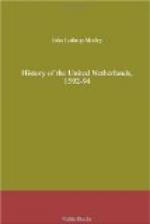The disinterested man had expressed his assent to the views of Philip in regard to the assembly of the estates and the election of king, but had claimed the sum of six hundred thousand dollars as absolutely necessary to the support of himself and followers until those events should occur. Alexander not having that sum at his disposal was inclined to defer matters, but was more and more confirmed in his opinion that the Duke was a “man of truth, faith, and his word.” He had distinctly agreed that no king should be elected, not satisfactory to Philip, and had “stipulated in return that he should have in this case, not only the second place in the kingdom, but some very great and special reward in full property.”
Thus the man of truth, faith, and his word had no idea of selling himself cheap, but manifested as much commercial genius as the Fuggers themselves could have displayed, had they been employed as brokers in these mercantile transactions.
Above all things, Alexander implored the king to be expeditious, resolute, and liberal; for, after all, the Bearnese might prove a more formidable competitor than he was deemed. “These matters must be arranged while the iron is hot,” he said, “in order that the name and memory of the Bearne and of all his family may be excluded at once and forever; for your Majesty must not doubt that the whole kingdom inclines to him, both because he is natural successor, to the crowns and because in this way the civil war would cease. The only thing that gives trouble is the religions defect, so that if this should be remedied in appearance, even if falsely, men would spare no pains nor expense in his cause.”
No human being at that moment, assuredly, could look into the immediate future accurately enough to see whether the name and memory of the man, whom his adherents called Henry the Fourth of France, and whom Spaniards, legitimists and enthusiastic papists, called the Prince of Bearne, were to be for ever excluded from the archives of France; whether Henry, after spending the whole of his life as a pretender, was destined to bequeath the same empty part to his descendants, should they think it worth their while to play it. Meantime the sages smiled superior at his delusion; while Alexander Farnese, on the contrary, better understanding the chances of the great game which they were all playing, made bold to tell his master that all hearts in France were inclining to their natural lord. “Differing from your Majesty,” said he, “I am of opinion that there is no better means of excluding him than to make choice of the Duke of Mayenne, as a person agreeable to the people, and who could only reign by your permission and support.”
Thus, after much hesitation and circumlocution, the nephew made up his mind to chill his uncle’s hopes of the crown, and to speak a decided opinion in behalf of the man of his word, faith and truth.




